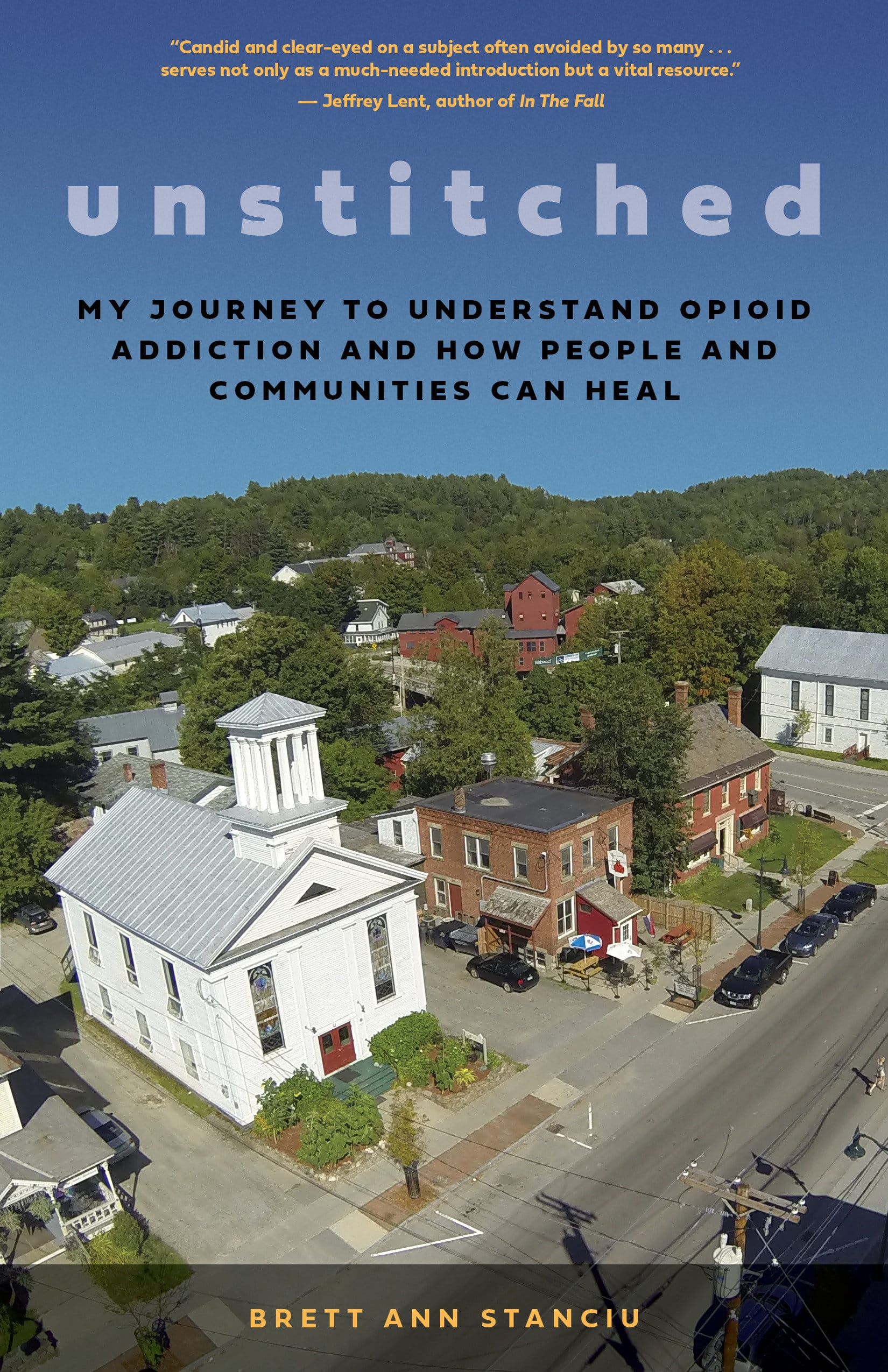My Journey to Understand Opioid Addiction and How People and Communities Can Heal: Unstitched
15.00 JOD
Please allow 2 – 5 weeks for delivery of this item
Add to Gift RegistryDescription
What if society looked at addiction without judgement? Unstitched shares the powerful story of one librarian’s quest to understand the impact of addiction fed by stigma and inevitable secrecy.The opioid epidemic has hit people in communities large and small and across all socio-economic classes. What should each of us know about it, and do about it? Unstitched moves readers from feelings of helplessness and blame into empathy, ultimately helping friends, family, and community members separate the disease of addiction from the person underneath.A stranger, rumored to be a heroin addict, repeatedly breaks into the small-town library Brett Ann Stanciu runs. After she tries to get law enforcement to take meaningful action against him—elementary school children and young parents with babies frequent the place after all—he dies by suicide. When she realizes how little she knows about opioid misuse, she sets out on a mission, seeking insight from others, such as people in recovery, treatment providers, the town police chief, and Vermont’s US attorney. Stanciu’s journey leads to compassionate generosity, renewed faith, and ultimately a measure of personal redemption as she realizes she has a role to play in helping the people of her community stitch themselves back together.
Additional information
| Weight | 0.232675 kg |
|---|---|
| Dimensions | 1.524 × 13.9954 × 21.5392 cm |
| Author(s) | |
| Format Old` | |
| Language | |
| Publisher | |
| Year Published | 2021-9-14 |
| Imprint | |
| Publication City/Country | USA |
| ISBN 10 | 1586422693 |
| About The Author | Librarian Brett Ann Stanciu is a graduate of Marlboro College and recipient of a Vermont Arts Council Creation Grant. Her novel Hidden View, published in 2015, portrays the challenges of family and hardscrabble farming, loss, and the possibility of redemption. She lives in the Northeast Kingdom of Vermont with her family. |
“…A compelling read, and an important one.”–Literary North “This is a deeply compassionate and extremely important book” –The Deerfield Valley News“…by approaching these conversations with humility, willing to listen and not judge, Stanciu gathered an illuminating collection of testimonials."–Seven Days“…written in such an accessible manner that I found it difficult to put down.” –Addison County Independent "…as gripping as a good novel. Stanciu skillfully weaves together the complexities of addiction and the opioid crisis, and it’s hard to put the book down."–Montpelier Bridge"Unstitched is a harrowing, and absorbing read about addiction, and discovery. compassion, persistence, knowledge, and strength. A book that is hard to put down once started, due to the gripping, but frequently beautiful writing of the author." — The North Star Monthly"This is both a page-turner and a primer in understanding the many complex dimensions of the opioid crisis in a rural state, where the reader accompanies the author in her own recovery and process of discovery. Ultimately, it is impossible for any of us to be totally disconnected from the impact opioid use disorder has on our communities, and it is through reading Stanciu’s skillful, compassionate and thoughtful rendering of personal stories that we can all gain valuable insight, diminish harmful stigma, and foster true healing." –Dr. Mark Levine, Vermont State Health Commissioner"Powerful! An exploration through education of substance misuse disorder and its impact on small town idyllic Vermont. The personal redemption and recovery story of the writer is beautifully interwoven with insights into stigma, opioid misuse and finally recovery through purpose, community and connection. Beautifully crafted and a must read for anyone affected by substance misuse disorder."–Fawn D. Montanye, Executive Director Vermont Recovery Network"I took a sobering read through this book because it focuses a lot on community, conversation, Vermont and the effects/impacts of substance abuse on all lives involved. This book allows the reader to be a bystander to the heartbreaks, headaches, and heartwarming forays into understanding how things ended up the way are. This book can empower us and at the same time provide hints of destruction of the family system, and an inability to move forward with our lives when working through recovery."–Jason Broughton, Vermont State Librarian & Commissioner "The opioid crisis darts jagged all around us, if we but open our eyes to it. Unstitched deftly lays out the groundwork for the crisis but also probes deeply into the personal, bringing the reader face to face with stories of tragedy and loss, courage and great strength as well as just plain luck, good and bad. Brett Stanciu is brutally honest about the jaws of addiction, candid and clear-eyed on a subject often avoided by so many. In our small state the notion of community holds us together at all levels, as, in fact, community flourishes most places. Within lies perhaps the greatest hope to meet this dire need. For many of us, Unstitched serves not only as a much-needed introduction but a vital resource to be returned to, over and again." –Jeffrey Lent, author of In the Fall and Before We Sleep"Unstitched is riveting, compassionate, topical, and one of the best books I've read this year. Stanciu, in beautiful prose, takes on the impact of the opioid epidemic on a small Vermont town with the gusto and suspense of a fine mystery novel, and the empathy that only a truly fine observer of the human condition could muster. Highly recommended."–Thomas Christopher Greene, author of The Headmaster's Wife and The Perfect Liar, Founding President of Vermont College of Fine Arts "Unstitched should be mandatory reading. It is a heartbreaking, raw, tender and revelatory look at addiction and its pervasive grip on ourselves, our families, our communities, and our rural towns. It is also a sublimely written narrative of transformation, vulnerability, discovery and love. This book undid me as I read—taking me into the heart of suffering, revealing my own habits, biases and fears—and then it gathered those pieces together and braided them into something new: a vision of hope, connection, possibility and healing for us all. Stanciu’s courage, generosity, curiosity and gorgeous words are the very best of guides."–Robin MacArthur, author of Heart Spring Mountain and Half Wild "While Unstitched begins as a true crime memoir set in an idyllic small Vermont town, soon it explodes into an exploration about “the ugliness of poverty, the ravages of drug addiction” as Stanciu studies our nation’s and her own addition crises. Stanciu shines a light on the things we don’t want to see: drug and alcohol abuse spread throughout our hometowns, including her own. Stanciu’s beautiful light, and stunning writing, transforms those who are considered “once a junkie, always a junkie,” into our friends and neighbors—where “recovery is possible” and “we are alike.” By the end, this smart, thoughtful, and beautifully written book asks, “What if [we] had been able to see beyond the stigma?” while asking us, the reader, to do the exact thing since, “These people are us.”–Sean Prentiss, author of Finding Abbey and Crosscut: Poems "With this thoughtful and thought-provoking book, Brett Stanciu shines a light on the twin tragedies of addiction and suicide that have infiltrated every family in America, even more so during the pandemic. Following the suicide of a man she hardly knew, Brett embarks on a quest to better understand the grip of addiction, meeting and listening to families who have been torn apart by this scourge. Each of the stories is powerful; Jenna's will break your heart. And stay with you.Having grown up on a Vermont farm, descended from Scottish ancestors who were the first to settle this area of the Northeast Kingdom 200 years ago, I find it hard to reconcile the wave of addiction scouring our state with my own experience, and bucolic image, of life here in Vermont. Addiction, and all the dark aspects associated with it, is a subject I'd like to ignore. But ignoring it isn't going to help or make it go away, and Brett's book has led me re-examine what I could do to be part of the solution; I wish I could have helped Jenna. This book may provide a lifeline to someone in need, and might begin a conversation that saves a life.It will take all of us together to save our communities. As Brett states so eloquently, "The possibility of redemption shimmers before us." Her book shimmers with hope; there are still things an individual, and a community can do, to make a difference."–Natalie Kinsey-Warnock, author of As Long As There Are Mountains and The Canada Geese Quilt"In this gripping memoir, Brett Ann Stanciu explores a small-town tragedy with deep empathy and insight. Weaving the people and landscapes of Vermont with the history of the opioid crisis, she delves into her own darkness to seek what connects us. Beautifully crafted and researched, this book is for everyone, whether you’ve known the secret pain of addiction in your family or seen it ravaging your community. A luminous act of compassion and courage."–Diana Whitney, author of You Don’t Have to Be Everything"With compassion, curiosity, and a fine eye for detail, Brett Stanciu takes us on an unforgettable journey into the world of addiction and recovery in rural Vermont. The result is a beautiful and affecting story about the resilience of spirit and of community, at precisely the time we most need an abundance of both."–Ben Hewitt, author of The Town That Food Saved and Homegrown "The shift in scale throughout Unstitched—from a tiny Vermont library, from one person’s annoyance with one addict’s break-ins, to the global scope of the opioid epidemic—is gut-wrenching. In a memoir that is generous and capacious at the same time that it is intimate, difficult, and finely wrought, readers will be carried by this deftly woven investigation into addiction in a small town. Brett Stanciu opens every door she can find, including in herself, in order to understand one of the most inscrutable ways we can lose ourselves and each other. I didn’t want to read this book, given my own family’s loss, and then I couldn’t put it down. Unstitched is the book about addiction that everyone needs to read—if we are ever to understand what needs to be done." –Kerrin McCadden, author of Keep This To Yourself |
|
| Excerpt From Book | o n eSeeking ShelterOn a cold-throttled Thursday afternoon in January, shortly after theholidays, library trustee Susan Greene walked in on an intruder inthe Woodbury Library. Minutes before, a neighbor had messagedSusan after spying a local man named John Baker hurrying aroundthe back of the library. Though the library was closed, the lights hadblazed on briefly, and she guessed Baker had broken in again. WhenSusan rushed through the front door and saw Baker, she grabbed thedesk phone and shouted that she was dialing 911. Baker fled throughthe side door. Then Susan called me, the librarian of this one-roomrural Vermont library.I was home folding laundry. That day, with a forecast high of fourteendegrees below zero, the superintendent had canceled school.At that temperature, buses couldn’t run reliably, and some kids wholived in the village and walked to school lacked winter clothing.When I hung up the phone, I told my twelve-year-old daughter,Gabriela, who was rolling out biscuit dough, that I would be back assoon as I could.She paused, her floury hands on the marble pin. “You okay?”“I’ll call. Your sister will be home soon.”Rushing out of the house, I forgot my gloves. As I drove the sevenminutes from Hardwick, where I live, to Woodbury, I blew hard onone hand, then the other, to warm my fingers.Over the past year, John Baker, a rumored heroin user, had repeatedlybroken into the library. I hoped the camera I’d hidden in thelibrary bookshelves had snapped a photo of him; the state’s attorneyhad bungled a previous charge, and I needed evidence to reopen thecase.When I arrived at the library, Susan’s husband, Randy, and theirtwo teenagers were standing just inside the front door. Her willowyhips leaned against my desk. The fluorescent lights glared. With theheat turned down and the day so cold, clumps of snow tracked in byour boots hadn’t melted into the hard-worn gray carpet.“What happened?” I asked.Each of them stared at different places — Randy at his wife; theirdaughter, Rachel, at a spider plant on the windowsill — but avoidedmy eyes. No one said anything.I had known Susan for several years and knew she had a habit ofpausing to stare right or left before she spoke, judicious with herwords.I repeated, “What happened?”Randy answered, “The dispatcher on the neighbor’s scanner saidBaker shot himself. The ambulance is on its way.”“What? John Baker shot himself ?”Randy shifted his weight from one foot to the other. “That’s whatwas called in.”“But he was just here?”“He ran home and shot himself.”Less than half an hour had elapsed since Susan called me. I pulledmy hat off my head and turned it around and around in my hands.My daughter had crocheted it from chunky turquoise yarn. “He shothimself over such a minor crime?”Randy tugged on his insulated leather gloves. “Come on, kids.We’re going home.”“Dad,” his son, Ben, protested.“I said, we’re going home. Don’t argue.” He opened the door andheld it while the teens walked out in the dark.Shivering in the chilly room, I turned on the heater. Withoutremoving my coat, I pulled up a chair on the public’s side of mydesk.Susan hunched in my usual chair, facing the dark computer screen.“I doubt the state police will come here,” she said. “They’ll be toobusy at his house. I’ll walk down to the fire department later and askwhat happened. You don’t need to stay. I’ll call you later.”On the desk between us, a facedown phone buzzed.I unzipped my coat. “I’m staying.” The phone vibrated again. “Doyou want to answer that? Maybe it’s your family.”“It’s his. He dropped it in the snow when he ran out. I followedhim — I was yelling — and found it.”The phone lay on my desk beside a bright orange origami box aboy had folded for me. Inside the box were secreted a large greenpaper clip, a plastic pig, and a purple yarn bracelet a child had madeand forgotten. We waited in the quiet without speaking, the phonesporadically buzzing.The heater whooshed on. I walked around and watered the plants.Pausing at the window, I cupped my hands around my eyes near thecold glass, peering into the darkness, and saw nothing but the reflectionof my two eyes staring back at me.Nearly two hours later, Rachel returned with news. The Bakerslive on one side of Route 14, and the Greenes live on the other. “Theambulance left their house, and the chief ’s car is back at the station.”Susan stood up. “Did you hear? Is he alive?”“I don’t know. Let’s go ask the chief.”We zipped up our coats. In the darkness, I fumbled sticking thekey in the door lock. The exterior library light had blown out beforeChristmas, and I hadn’t replaced it. We walked in silence to the firedepartment, a short distance down a slight hill. I cinched my scarftighter around my face. Clouds screened the stars and the moon. Atthe fire department, we filed in the back door, where we found thechief, Paul Cerutti, sitting at a desk so large it dwarfed him, fillingout paperwork.He set down his pen. When not serving as the volunteer fire chief,Cerutti works as a fire safety inspector.Susan asked, “Is he . . . ?”“It’s not your fault,” Cerutti answered calmly.“He’s dead?”“He’s dead all right. Did it in the room where his parents keepfirewood. My guys are cleaning up.”Susan shuddered. I was afraid she would fall over. Rachel and Iwrapped our arms around her.“Go home,” Cerutti said. “The state police don’t need anythingfrom you. You’ve done nothing wrong. Listen, I’ve spent years tryingto help people. The problem, mostly, is the people.”Susan stepped out of our arms and placed Baker’s phone on theedge of the chief ’s desk. “It’s his. I don’t know what to do with it.”“I’ll get it to where it needs to go.” Cerutti leaned back in his chairand studied Susan. “Don’t beat yourself up. If you need help gettingover this, just ask. No shame there. Sometimes the hardest thing isto ask for help when you need it.”On the verge of crying, she crossed her arms over her chest andheaded for the door. Following her and Rachel, I said over my shoulder,“Thank you.”Without standing, Cerutti opened his desk drawer, depositedBaker’s phone inside, and slid the drawer shut. “I mean it about help.We’ve all been there.”Outside, we paused under the upside-down luminous cone of thedoor lamp. In our bulky jackets, the three of us embraced. ThenSusan drew back and told her daughter, “Let’s go home.” Theycrossed Route 14 and disappeared into their clapboard house.I walked back to my car, hands jammed in my coat pockets. Ipassed the unlit Episcopal church, my bootheels striking the icyroad, the sole sound in the night. Above my scarf, the cold clawed atmy eyes and forehead.I drove home, my headlights splitting the darkness as I left thevillage and headed down the mountain pass. On this frigidly hostilenight, the roads were empty. After I pulled into our driveway, I sat fora few moments. The cold crept into my lap and slunk beneath thecollar of my coat. I imagined Susan standing outside the library,shouting, watching Baker run away, his phone falling from his pocket.Wait, I thought. But it was too late. |
Only logged in customers who have purchased this product may leave a review.






Reviews
There are no reviews yet.